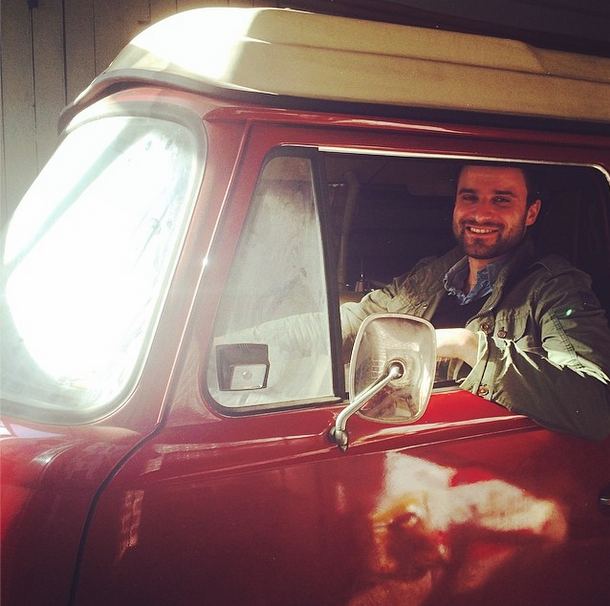The Postscript: Tobin Dalrymple on "The Parallel Highway"

In his Summer 2014 feature, Tobin Dalrymple introduced us to the tragic love affair between Montreal writer Carol Dunlop and Argentinian novelist Julio Cortázar. Here, Dalrymple explains how moving to Paris, camping along the highway and enduring a bad breakup were all steps in piecing together the story of Dunlop and Cortázar.
Yining Su: How did you first come across Carol Dunlop and Julio Cortázar? Were you familiar with their work before you began to research their lives?
Tobin Dalrmple: I have been a fan of Julio Cortázar ever since my first trip to Argentina after university. There, I fell in love with the country and the writer—and he has been close to my heart ever since. I always knew he had a Canadian wife, but it was only a few years later that their story would come to me.
After a bad break up with an old Argentine love, I picked up Autonauts of the Cosmoroute and was blown away. Not only was this one of the best love stories I had ever read, but there was so little known about the two. Especially Carol. She immediately became a mystery to me: a great Canadian writer who no one knew about. I was hooked.
YS: In addition to this piece in Maisonneuve, you’re working on a documentary film about Dunlop and Cortázar. Is this your first full-length doc?
TD: This is my first full-length film. It’s my first film, period. I was working in a marketing job when I discovered their book. I hated my life. I was in a bad spot. I was so blown away by what I discovered, I decided to pack up my things and move to Paris for a half year. I brought a camera and a notepad, a few voice recorders. I wasn’t sure if I was making a movie, a novel or a radio piece. I just knew I had to tell the story.
After a while, I started meeting more people and the thing snowballed. I was flying all over the world, meeting a network of friends and lovers and fans—all of whom were so touched by Julio and Carol’s love. I grew my team. I pitched the story at Hot Docs, and everything has been exploding ever since.
We raised $12,000 on Indiegogo to help pay for the research. And now we’re still in the middle of production. It’s a fun ride, and I can’t wait to deliver the film in 2015.
YS: You've said you weren't sure if you were making a movie, a novel or a radio piece. When did you become sure that you were making a movie? And when and how did you decide to also write about it for Maisonneuve?
TS: It's hard to say. I think I knew I was making a movie all along. It's not like one day I just decided. It was just one day I was making a movie and it was the most natural thing. There was no eureka moment. It's like having hands. I have always had hands. And I have always been making a movie. That's how it feels.
I just started out like an explosion and brought all the gizmos with me possible. It's likely I will still do radio, do novels. Everything that happened on that trip was so sacred, and wonderful.
I decided to write for Maisonneuve. I wish I could remember when I got their letter. I think it was months after I had pitched. One day [Editor-in-Chief] Haley Cullingham sent an email seeing if it was still a story I could write for Maisonneuve. I had been rejected by a million people and it blew me away.
I remember being alone out there on the highway and getting a rejection letter and feeling so alone and crazy. A few nights sleeping out on the grass, next to a stupid, gas-smelling, old and cold highway. With a broken heart, it was terrible and lonely.
But I made it through. And the story kept me afloat the whole time. Meeting people along the way—anytime I shared Carol and Julio's story they would light up. And I think that's what kept me going.
That and the idea of winning back my true love obviously. Which didn't happen. Shucks.
This interview has been edited and condensed. Follow Tobin Dalrymple on Twitter @TobinTobin. Follow Yining Su on Twitter @YiningSu .





